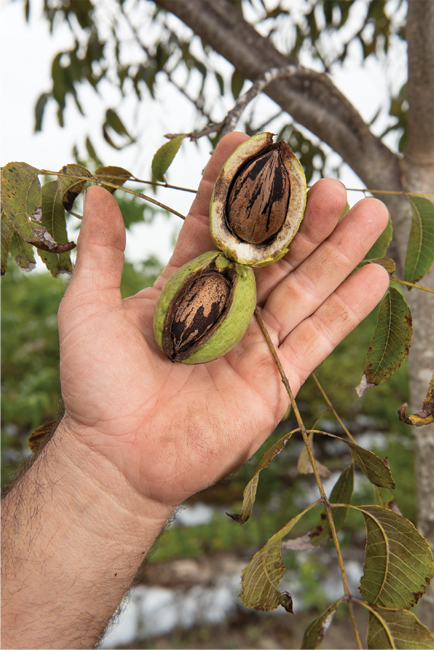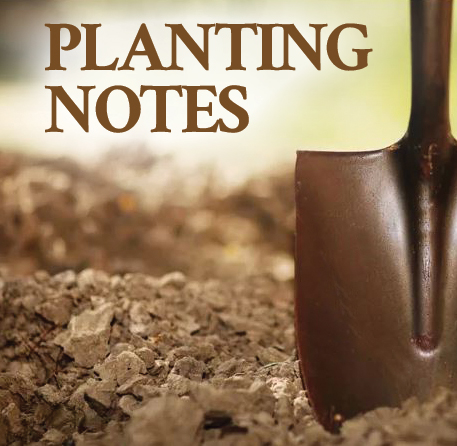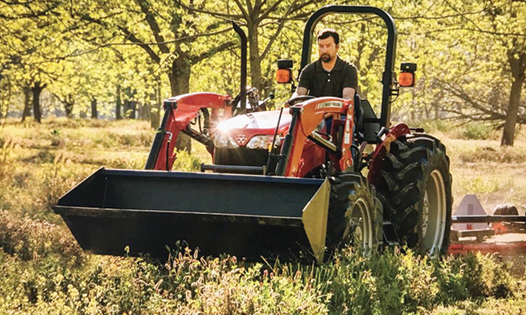We’re nuts for our pecan tree nursery.

In addition to our two patented trees, ’Eclipse’ and ’Excel,’
the tree nursery at Clough Pecan Company sells bare-root
seedlings of several other popular pecan tree varieties.
You can also talk to us about custom grafting your trees.

It is best to transplant bare-root trees while they are dormant, between December and March. To successfully grow pecan trees, it is important to water them regularly for the first two to three years. While you do not want to put fertilizer in the planting hole when transplanting – fertilizer can burn the roots, damaging or even killing the tree – you do want to apply fertilizer (about one pound of 5-10-5) in June after planting, distributing it in a 25-square-foot area around the tree, but not within 12 inches of the tree’s trunk. The following year, apply one pound of 10-10-10 fertilizer in March and in June, but again, keep the fertilizer away from the trunk.

Nursery Tree Pricing:
3-4 Ft bare-root nursery trees: $14 each
4-5 Ft bare-root nursery trees: $16 each
5-6 Ft bare-root nursery trees: $18 each
6 Ft+ bare-root nursery trees: $20 each
*Add $3 per size for Avalon & Ellis bare-root trees
Orders are taken year round for nursery trees. However, the trees sell out fast each year, therefore place your orders early. Six months minimum, in advance, is suggested for large orders.
Custom Graftings Available -Pre-planning is a must for custom grafting. Call for details: 912-449-4585
No trees are shipped. Trees must be picked up from Clough Pecan Nursery. Pick up is in January and February as most trees need to be in the ground by March 5th.
Nursery@CloughPecan.com for more info on bare-root nursery trees from Clough Pecan.
Avalon – UGA Variety
’Avalon’ is a new pecan cultivar patented by the University of Georgia and released to growers in 2017. It has a large nut size (46 nuts/lb.), similar in size to the popular ’Desireable’ pecan. Percent kernel is 53.7%. Harvest date is early mid-season. ’Avalon’ is highly resistant to scab.
Cape Fear
’Cape Fear’ is an early-bearing pecan tree that produces well-filled nuts with attractive golden kernels as a young tree. ’Cape Fear’ yields about 52-62 nuts per pound. The nuts are flavorful and resemble ’Stuart’ nuts in size and shape but with a superior cracking quality. The tree grows to a mature height of 75 to 100 feet. The tree is a Type-1 pollinator, meaning its pollen sheds prior to stigma receptivity, so it should be pollinated with Type-2 pecan trees. ’Cape Fear’ is hardy in USDA Zones 6-9.
Caddo
’Caddo’ is a highly productive pecan tree, yielding about 67 nuts per pound. Ripening in mid season, the nuts are oblong elliptical to oblong shaped with excellent shelling characteristics. The tree grows to a mature height of 75 to 100 feet. The tree is moderately scab resistant and is a Type-1 pollinator, meaning that its pollen sheds prior to stigma receptivity, so it should be pollinated with Type 2 pecan trees. ’Caddo’ thrives in USDA Zones 6-10.
Creek – USDA Variety
’Creek’ pecan trees yield about 54 nuts per lb. and have a moderate scab resistance. ’Creek’ nuts are long, narrow and elliptical in shape. The tree is a Type-1 pollinator and requires Type-2 pecan trees with which to pollinate. The tree grows to a mature height of 75 to 100 feet. ’Creek’ produces a nut crop as early as five years after planting. Harvest date is early October. It is hardy in USDA Zones 6-9.
Ellis – Patented Variety
’Ellis’ pecan trees yield approximately 43 nuts per pound with a 57% kernel. The nuts are large, oblong with excellent quality and good scab resistance. The tree can reach a mature height of 75 to 100 feet. The ’Ellis’ is a Type-2 pollinator and should be pollinated with Type-1 pecan trees. Harvest date is mid to late October. It is hardy in USDA Zones 7-9.
Kiowa – USDA Variety
’Kiowa‘s’ large pecans closely resemble ’Desirable’ pecans except for having a thinner shell. The ’Kiowa’ pecan tree is vigorous, yielding 40-50 nuts per pound, and reaches a mature height of 75 to 100 feet. ’Kiowa’ has medium resistance to scab. The ’Kiowa’ pecan tree is a Type-2 pollinator and should be pollinated with Type-1 pollinators. It is hardy in USDA Zones 7-10 and can be planted in full sun or partial shade with deep, moist, well-drained soil.
Lakota – USDA Variety
'Lakota' has a high nut quality, high yield potential, early nut maturity, and excellent tree strength. ‘Lakota’ is the only pecan cultivar that combines medium to large nut size, excellent scab resistance and a September harvest date. ‘Lakota’ is one of the only Type-2 early harvest cultivars, the other being ‘Kanza’, and matches well with other early harvest Type-1 cultivars such as ‘Pawnee’. ‘Lakota’ is also a good match with ‘Desirable’ for pollination. It is hardy in USDA Zones 6-9.
Oconee – USDA Variety
’Oconee’ has good yield potential, about 48 nuts per pound. The nuts are large, elliptical, grow in clusters, and are easily crackable. ’Oconee’ grows to a mature height of 75 to 100 feet. ’Oconee’ is a Type-1 pollinator and should be pollinated with Type-2 pecan trees. ’Oconee’ can be planted in full sun or partial shade as long as it is in deep, moist, well-drained soil. ’Oconee’ is moderately scab resistant and hardy in USDA Zones 6-10.
Pawnee – USDA Variety
’Pawnee’ has a high yield potential for high quality nuts. ’Pawnee’ pecans ripen around October. The nuts are large, averaging 53 nuts per pound, and thin shelled so they are easily crackable. Kernel quality is excellent, averaging 54%. ’Pawnee’ is a medium-sized pecan tree and can reach a height of 30 feet with a width between 15-25 feet. It can be planted in full sun or partial shade and can tolerate a variety of soil types. ’Pawnee’ is a Type-1 pollinator and should be pollinated with Type-2 pecan trees. ’Pawnee’ is hardy in USDA Zones 6-10.
Sumner
’Sumner’ is an excellent choice for a home or orchard, with a high quality yield visual appeal. It is noted for its disease resistance. ’Sumner’ has an upright growth and semi-open canopy, growing to a mature height of 75 to 100 feet. It is a Type-2 pollinator and should be pollinated with Type-1 pecan trees. It should be planted in full sun or partial shade, in deep, moist and well-drained soil. ’Sumner’ is hardy in USDA Zones 6-10.










